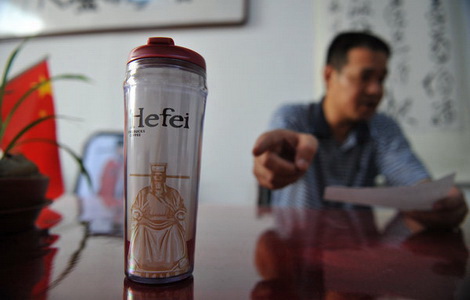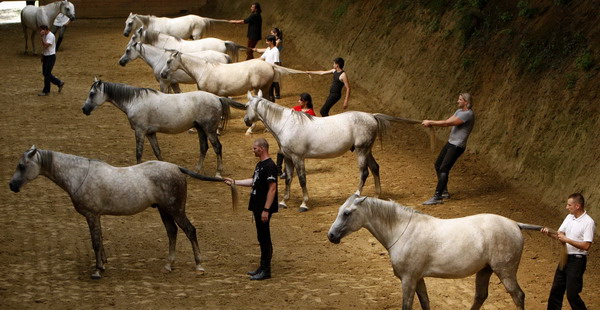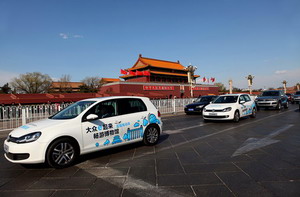Baogong has a case against popular Starbucks coffee mugs
Updated: 2011-08-11 15:19
(Xinhua)
|
|||||||||||
|
 A Starbucks coffee mug with the image of legendary Chinese Judge Baogong is displayed on the table.[Photo/CFP]
|
HEFEI-- Starbucks recently drew protest over its latest marketing efforts in China - this time upsetting the descendants of one of the country's most renowned judges after seeing his face plastered on the chain's coffee mugs.
The Seattle-based coffee chain ran into trouble after opening its first branch in the city of Hefei, the capital of east China's Anhui Province. The branch sells coffee mugs and bottles featuring an image of an 11th-century judge named Bao Zhen, more commonly known as "Bao Gong."
The mugs, priced at 90 yuan (about $14) each, were immensely popular, with more than 100 sold in less than two hours after the store opened on August 7, said a sales representative from the store.
The mug features a stern-faced Bao clad in traditional official attire sitting on a judge's chair under large text proclaiming "Hefei, Starbucks Coffee."
Bao Zheng (999-1062), who was born in present-day Feidong County near the city of Hefei, was a senior official of the Northern Song Dynasty (960-1127). He was highly esteemed for his strictness in upholding justice and opposing corruption, no matter how powerful the offending party was.
Bao Xun'an, a 36th-generation descendent of Bao and head of an association that studies and promotes Bao's spirit of integrity, said he was "shocked" to see his ancestor's face on the mug.
"He has a foreigner's face! It looks really absurd!" he declared.
Bao Xun'an said that the company's marketing strategy is disrespectful and might even be a violation of intellectual property rights (IPR).
Bao said his association has a copyright for "Bao Gong" logos.
"Does anybody think that Starbucks should refrain from cashing in on China's most famous upright official? Shall we act to protect our culture?" Bao asked.
Nobody knows exactly how "Bao Gong" really looked like, but Chinese literary works usually portray him as having a black face and a crescent-shaped scar on his forehead, a symbol of impartiality and judiciousness.
Local media quoted a Starbucks publicity official as saying that the "Bao Gong" image the company uses was created by its own designers, who took inspiration from a statue of "Bao Gong" in a local shrine. The official said that the copyright therefore belongs to the designers.
The official said the complaint was simply the result of differing artistic tastes. "We respect copyrights and we certainly respect Bao Gong," the official said.
Bao Xun'an refuted claims that he made the complaint to extort money. Bao said he did not intend to ask Starbucks for compensation, but instead just wants them to recall the mugs.
Bao said that he was "okay" with a Thai laundry powder brand using the image because it was in line with the judge's practice of "cleaning something dirty, like corruption."
Starbucks was forced to shut down a branch in Beijing's Forbidden City in 2007 after people complained that it was not appropriate for the popular American coffee chain to set up a store in such a culturally historic area.
However, the company is continuing to expand its reach in China, with plans to open 1,500 new cafes by 2015. The company also hopes to deepen its cooperation with China's coffee-growing province of Yunnan, according to Starbucks officials.
The coffee chain has opened 230 cafes in the Chinese mainland since the establishment of its first Beijing outlet in 1999.
Related Stories
Starbucks to launch JV with Chinese coffee-growing firm 2011-07-15 15:45
Starbucks buys back control of stores 2011-06-03 11:05
Starbucks buys back control of stores 2011-06-03 10:33
Starbucks in deal with JV partner in China 2011-06-02 13:31
- Disney Shanghai discloses operation mode
- China's July fiscal revenues rise 26.7%
- Tests find oil used by KFC not harmful
- China July cotton imports up 30.89% from June
- China set for massive rise in hotel numbers
- Hong Kong stocks fall 2.35%
- Media Markt plans larger network
- Shenhua Group in $8b Xinjiang coal projects













